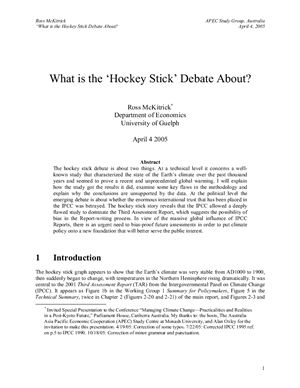Invited Special Presentation to the Conference Managing Climate
Change—Practicalities and Realities in a Post-Kyoto Future,
Parliament House, Canberra Australia. APEC Study Group, Australia.
April 4, 2005. 18 p.
The hockey stick debate is about two things. At a technical level it conces a well-known study that characterized the state of the Earth’s climate over the past thousand years and seemed to prove a recent and unprecedented global warming. I will explain how the study got the results it did, examine some key flaws in the methodology and explain why the conclusions are unsupported by the data. At the political level the emerging debate is about whether the enormous inteational trust that has been placed in the IPCC was betrayed. The hockey stick story reveals that the IPCC allowed a deeply flawed study to dominate the Third Assessment Report, which suggests the possibility of bias in the Report-writing process. In view of the massive global influence of IPCC Reports, there is an urgent need to bias-proof future assessments in order to put climate policy onto a new foundation that will better serve the public interest.
The hockey stick debate is about two things. At a technical level it conces a well-known study that characterized the state of the Earth’s climate over the past thousand years and seemed to prove a recent and unprecedented global warming. I will explain how the study got the results it did, examine some key flaws in the methodology and explain why the conclusions are unsupported by the data. At the political level the emerging debate is about whether the enormous inteational trust that has been placed in the IPCC was betrayed. The hockey stick story reveals that the IPCC allowed a deeply flawed study to dominate the Third Assessment Report, which suggests the possibility of bias in the Report-writing process. In view of the massive global influence of IPCC Reports, there is an urgent need to bias-proof future assessments in order to put climate policy onto a new foundation that will better serve the public interest.

